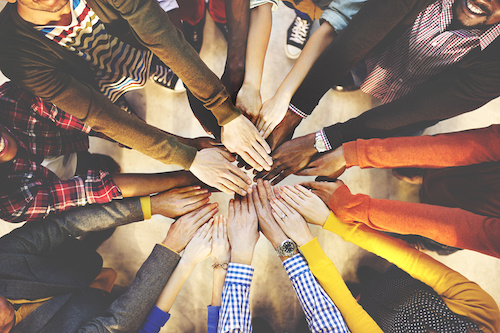How do we determine whether we truly belong or just “fit in”? The terms are often used interchangeably, but they do not mean the same thing.
The more closed we become,
The more foreign our spirits seem,
The more closed we become,
The more our heart’s quarantined.
The more closed we become,
The darker our heart,
The more closed we become,
The more apart.
The more territorial,
More terrorism.
Lemn Sissay, “Open up” (2013)
As mammals, we humans feel the importance of belonging to a tribe at a visceral level. Our very survival depended on it for centuries. If we were cast out of the tribe, or left behind, chances were high that we’d die. Making sure that our relationships with others around us ‘work’ remains an important biological imperative for every human. Therein lies one of the earliest issues around being part of any group – is it “belonging”, a sense of membership that is ours just as we are, or is it “fitting in”, which is about what we need to do/ demonstrate in order to be allowed to be part of the group? Writers including Irving Goffman[i] and Brené Brown[ii], among many others, have wrestled with these issues for decades.

Like most people, I started learning lessons about belonging, and about insider/ outsider groups as a child. I imagined myself to be an alien who had been dropped into my family home. I felt so different I was convinced I didn’t belong. My family culture was loud, aggressive, violent at times, malicious, capricious and controlling. No-one ever said “I love you”. No-one ever said “I’m sorry.” At a moment’s notice, anyone in the family might be made outcast for indefinite periods of time. My father once shunned me with radioactive silence for 3 months straight. My mother specialised in using anything she knew about our vulnerabilities to humiliate us. She cultivated the strategic use of public humiliation right up until I learned the skill to shut her down in my early 40s.
In that atmosphere, my soft, dreamy, sensitive, introvert nature felt wildly out of place and often painfully and dangerously so. Being me just as I was felt like a liability with a large, visible target symbol drawn on for all to see. Being me felt like something that I had better learn to change to something more acceptable if I wanted to be able to remain under the family roof and at least fly under the radar until I might be ready to leave.
In an effort to achieve what I thought would be a version of belonging – or, as I later realised, fitting in – I tried as best I could to follow family rules, to stay under the radar, to please, to morph and conform to what seemed to be family norms. At least, outwardly. My efforts were not reliably effective, but they seemed to offer some protection some of the time.
In addition, my family’s lifestyle of travelling all over the world, following my father’s work postings, exposed me to a lot of experiences of coming in from the outside. My father worked as a geophysicist. He led teams that drilled and analysed soil samples all over the world to see if these might contain petroleum or other valuable minerals for exploration. Following him around the globe, we travelled and moved every 3 to18 months. Each move meant at least another city, and usually, another country. By the time we had emigrated to Australia, I had lived in 10 countries and I had been to 12 schools.
My family arrived in Australia as migrants from another country in late 1971. We settled in rural NSW, where my parents threw themselves into the ambitious project of becoming farmers.
In this setting, those who could lay claim to being locally born and bred called us ‘wogs’. At the time, the term ‘wog’ was a local colloquialism for some sort of disease-causing bug or virus. Locals made it clear they saw us as contaminated and treated us as such. The term also denoted Mediterranean migrants to differentiate us from the local stock, who were derived of Anglo-Celt heritage[iii]. Hate speech, and outright physical and sexual violence were part of daily life for me.
My attempts at integrating myself into my new country became a whole new level of trying to “fit in”.
I polished my English, did the best I could to eradicate my accent, and tried to emulate as much as I could the way the girls around me spoke. I worked hard in school to be as proficient as I could be in written English literature and grammar.
I carefully divested myself of any and every trace of foreignness I could find. I worked on smiling the “right” way, tried hard to curb any and all extravagant arm gestures, reined in the range of tone and pitch of my voice so I’d sound more “calm and cool” like the local girls around me. I worked to show as little facial expression as I could in order to appear “cool”, or at least, either unreadable or fake being unaffected by whatever was going on. The one visible thing I couldn’t control or change was my olive skin and my physical shape, both were a constant source of pain when attackers came after me.
I put up with a shortened form of my name the other kids gave me which I hated. At least, I told myself, it served to mute my French origins. Becoming the fictional “Mary” helped me to feel more like I was steeping into a character in a play as I worked to turn myself into a version of the Anglo schoolgirls around me. I was only partially successful in this bid as my brown haired, brown skinned, rounded Mediterranean body remained a far cry from the fair-skinned, freckled or creamy toned, blond or red haired lean-bodied and athletic norms I saw all around me.
I learned to ditch any trace of my wog foods (salami, garlic) before recess or lunch. If I didn’t have money to buy food at the tuck shop, which was often the case, I preferred to go without until the last bell rang. Hunger was better than racist taunts.
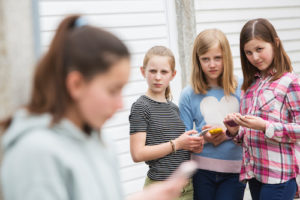
I learned to walk the tightrope of playing down how much I knew at times, while also being capable and knowledgeable at other times. I learned to hone a very fast and caustic tongue, and mastered the art of using it to take down the status of a key ring member in public as a way of self-protection. This strategy proved to be quite a delicate balance to master – how to look like I was having a “joke”, Aussie-style, at someone’s expense, without seeming to humiliate them too much in front of their friends. I learned that, if I went far enough, I bought myself some buffer for a bit longer i.e. more time before the next racist attack or bashing. If I was seen to have gone ‘too far’ (meaning, I was seen to have insulted one of the in group by ‘overstepping’ my position), it would all backfire and the price in revenge violence was fierce.
That mix of smart-but-not-too-smart and funny, once mastered, helped me keep a degree of buffer from would-be attackers.
Most of the time.
The power brokers in the school grounds and among openly racist school teachers got to keep just enough of their imagined superiority and the privilege it afforded them to save face, feel powerful and in control. My deadly humour, and shows of knowing more than I let on at other times, also served as a warning not to underestimate me too much in the high-stakes teenage world where public humiliation could reverse the balance of power in an instant and was feared by all.
I wanted to make sure that I left no stone unturned when it came to showing my peers that I was truly willing to embrace my new culture and dive into it. I learned the local ways, the priorities and tried to emulate them. I so wanted to belong.
Eventually, I made some friends. Or, so I thought. They weren’t the cool kids, naturally, but they were decent enough. These kids seemed willing to make room for me and take me in as one of theirs. We ate together, played together, talked companionably together. I began to feel maybe I’d found my place in the community.
I was wrong.
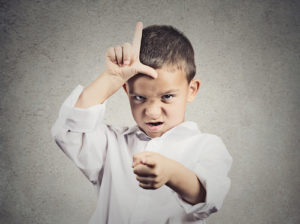
I remember how crushing it was for me if I ever got into a conflict with any one of the small group of peers who had taken me in. Suddenly, out of nowhere, I’d hear “fuck off you wog!” “We don’t want you here! Fuck off / go back to where you came from.” And they too would turn on me as a unit and I’d be ostracised. Just like that. It might take weeks to be allowed back in.
That sense of having to work impossibly hard to “fit in”, to be acceptable to those who get to set the bar of acceptability haunted me throughout my years in high school and later, in university. That sense of being “in”, only to be thrown “out” at no notice over who knew what infraction caused me no end of anxiety and grief.
Had I been too cocky? Had I been too stupid? Had I been too ambitious in picking my mark for a showdown? Had I been too open about my views? Had I shared the wrong views? Had I been too quickly too visible after being off the radar for too long? I agonised over these questions in a desperate bid to try to identify what the definitive ingredient might be that would secure me what seemed to be the illusory permanent membership.
Who knew?
Each time it occurred, I learned that my carefully constructed cocoon of control and safety could and would suddenly, violently, unpredictably, and inexplicably, be blown open. I learned that there was nothing I could do to predict it, to stop it, try as I might. All I could do was hang tight, be extremely savvy about reading environmental clues from people and context around me from moment to moment, and try to assess, devise and implement the most useful strategy forward from there, always carefully re-evaluating the strategy and adapting it to changing conditions as they emerged.
My years in country Australia taught me the difference between what I’ve come to think of as ‘conditional membership’, really, a form of fitting in, and real belonging.
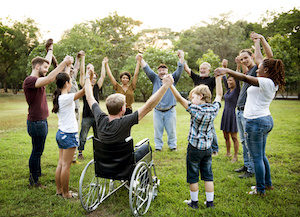
Conditional acceptance or membership is just that – it is what it says on the box. One’s so-called membership can be revoked at a moment’s notice. Where one thought oneself to be a full member of a family, a community, a religious or interest group, or society with the same rights as others, one suddenly realises that one’s rights are subject to unpredictable and hard-to-defend reversals. Once lost, conditional acceptance and the conditional membership that it opens is hard to re-instate.
Since thinking about conditional membership as something that can be revoked, I have been able to make sense of times when I have been cast out from a group – no longer being seen as compliant with the group’s norms and standards, deemed no longer suitable to be a member. Sometimes, the change in my eligibility has come because the group has changed its membership requirements. At other times, it has come because I have spoken out in challenge of a group position, or openly championed the cause of someone or a group that’s deemed outsider by the group and so on. At other times, my own evolution as a person has stripped me of my eligibility in the eyes of those who confer conditional membership.
The thing with conditional membership is: you never know that what you took to be your sense of belonging was merely conditional until you’re stripped of your membership. Expulsion from the group can be incremental and hard to notice until you find you really are on the ‘outer’ – no longer getting invited to events, not getting access to information, not receiving replies to your communication. At other times, it can be very sudden and very, very painful. The fall from seemingly full member to outcast is unmistakable. And usually, in my experience, irreversible. Either because the in group won’t let you back in or because you realise you don’t want to be in the in group any more.
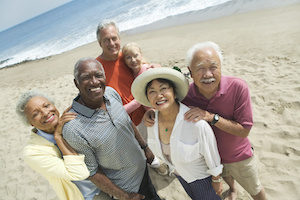
Conditional membership is evident in the current push in the US to revoke automatic citizenship that was granted to people born on US land. All over the world, conditional membership is seen in the expulsion of people from lands on the basis of race, religion, heritage. It’s the barring of females from education and access to public roles in various societies with the ascendance of retrograde movements. It’s in the roll back on trans peoples’ rights in the US. It’s the constant push to roll back hard-fought-for rights to body autonomy for women. It’s in the roll-back of human rights for people everywhere – minorities, LGBTQIs, women. The list is endless.
This business of who belongs and who doesn’t is a key one for people everywhere right now. Who gets to decide? And on what grounds? Who gets to decide seems to be whoever is in the dominant group that reserves the right to hold on to their privileges and access to resources. These are the folk whose level of entitlement I have described elsewhere as possessing a distorted inflated sense of entitlement.
In the township my parents moved to, we were told “You weren’t born ‘ere!” as the reason for remaining eternally outsiders. In school, my skin colour, my curly hair, my body shape, wearing eyeglasses (!), and my accent all were cited as ‘reasons’ for any violence and discrimination meted out to me, and as reasons why any claim to belonging I might have thought I had to be revoked or questioned. Later as an adult, I was challenged for not fitting the ‘look’ that members of activist groups I saw myself as having a right to participate in considered I should wear. Too feminine to think and be an activist, apparently.
What we take for granted (when we think we belong) may, in fact, be merely conditional membership – fitting in. To the degree that we only have conditional membership, we do not have rights – we only have temporary permission and privileges. Privileges, by definition, can be revoked in an instant by those with the power to decide to grant them.
The consequences of being declared an outsider are dire – to wit right now, the barring of access to desperately needed resources for refugees and people declared outsiders everywhere. Once we are declared ‘aliens’, non-members of the in-group, we lose any official recognition of our rights. We become Things, Others – and that opens the doors for some of the worst atrocities mankind has seen over centuries.
Maya Angelou [iv]said “You only are free when you realize you belong no place – you belong every place – no place at all. The price is high.” I find those words both heartening and challenging.

The urge to belong to a group is strong in me. I think it’s strong in all of us. Yet, when I remember to prioritise belonging to myself, and drop my attachment to fitting in, I get to be true to myself, I get to think more clearly about what right action is for me, and, while things don’t necessarily get to be easier, they certainly get more in alignment with who I know myself to be. I find it easier to find and use my voice, both in service of myself and in service of others. I feel my integrity.
I want to acknowledge that this stance is something I have the luxury to do in a context where, so far, my assets, my right to have an opinion and voice it openly, my right to work and earn my livelihood, and my right to make choices about how I live my life aren’t being taken from me overnight. Who knows if I would hold on to these lofty words if my circumstances changed?
Conditional membership of all sorts of groups has been revoked by vested power groups in an instant throughout history. We certainly saw this happen to the Jews in Europe and Nazi Germany in the late 1920s and 1930s. We have seen it with the roll back on women’s ability to exercise personal autonomy over how they look, their movements, access to education, work, and personal finances in a number of Middle Eastern countries such as Egypt and Iran in the second half of the twentieth century. We are seeing it now with the Rohingya people everywhere, the Kurds, and refugees everywhere. We are seeing it right now in the US with the multiple examples of constant undermining and questioning of POC’s freedom to go about their lives each time some white person reports them for being ‘out of place’ according to racist white ideas – such as in parks having time with their families, at a University college campus, residing in a middle class apartment complex, and owning a car. Here in Australia as elsewhere in the world, the rise of the alt-right and Neo-nazis represent the essence of the kind of repressive roll-back such movements try to bring on to withdraw membership and freedoms of people everywhere in the name of restoring white supremacy and dominance.
Perhaps one way we might be able to stem this regressive tide is if we all examine our own sense of belonging/membership and consider how it plays out in our own lives and how we impact others.
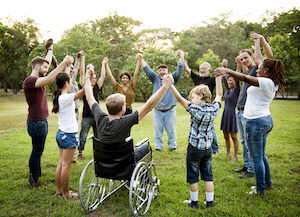
If you’re struggling with your version of belonging or conditional acceptance, ask yourself—
- Do you feel secure in your membership of your group – family, work/student/sport/religious group or community? Are there any conditions that would potentially risk stripping you of your membership status? What are they?
- If you do feel secure in your membership status, what benefits, privileges are yours because of your membership to the group? What difficulties do you ever have to deal with?
- If you’re an outsider, what’s it like to know you don’t belong to the bigger group, and what are the ways you confront this reality in your everyday life?
- If you’re an outsider, what privileges and benefits DON’T you have as a result of your status?
- If, after reading this article, you are beginning to suspect that what you took to be “belonging” was actually conditional membership, what are the clues in your own life experience that are warning you of this sad reality?
- If you are secure about being in the in-group, consider whether there are ways you marginalise others who are not so fortunate, ways you assume a greater right of way over others. Are you open to addressing and changing these in the interests of a fairer, more diverse and inclusive world?
- If you belong to the outsider or conditional membership group, how can you shift your focus away from mainstream standards for fitting in?
If you’d like to address your own experience of belonging/ not belonging, conditional membership (and having it revoked), and the impact these experiences have had on you and how you live your life, call me and let’s see what we can do to support you.

[i] Erving GOFFMAN, (1963 ) Stigma: notes on the management of spoiled identity, Englewood Cliffs, NJ, Prentice-Hall.
[ii] Brene BROWN, (2010), The gift of imperfection, Hazelden.
[iii]https://www.theguardian.com/world/2005/oct/13/australia.andrewclark
[iv] https://www.brainpickings.org/2013/06/14/maya-angelou-bill-moyers-1973/

